PHUKET: Shackles and locked cattle pens for people were found yesterday in a human traffickers' camp in the jungle of southern Thailand.
Activists and Thai media, moving ahead of local authorities, found a large, recently-deserted camp capable of holding hundreds that is said to be just one of several along the Thai-Malaysia border.
In some cases, it's not clear whether the camps are in Thailand or Malaysia.
Two left-behind captives, a girl and her 11-year-old disabled sister, were helped out by the investigating team.
Beatings and torture are reported to have occurred in the camps to extract ransoms from the family and friends of captives, with rapes and murders occurring as well from time to time.
The beatings would usually begin when captives made telephone calls to relatives, pleading for money, so that relatives understood what could be involved in not cooperating.
For years, escapers and survivors have been telling Phuketwan and journalists at other news organisations about what happens in the jungle camps of southern Thailand and the mangrove islands off the Andaman holiday coast.
Oppressed Rohingya from Burma (Myanmar) and Bangladeshis seeking a better life are trafficked by boat to the Andaman coast then sold to ''brokers'' who transfer them to the southern jungle camps where larger ransoms are extorted.
With the discovery of 26 graves around one camp at the weekend, interest in human trafficking through Thailand has suddenly become intense.
Phuket will become an important part of what happens next when senior Thai Royal Police meet with senior Malaysian police to discuss the trafficking issue from May 11-14.
It's not clear whether the summit on the holiday island of Phuket came as a result of the discovery of the camps or was already scheduled. Other issues are also set to be discussed.
With camps where graves have been found now evident in the arrival zone along the Andaman coast and the departure zone along the Thai-Malaysia border, questions are being asked about how thousands of boatpeople were transferred hundreds of kilometers by road from western Thailand to southern Thailand without detection by authorities.
Following the discovery of two sets of human remains off the Takuapa district north of Phuket yesterday, three more graves were found by local officials today.
Traffickers are said by survivors to have shot dead or beaten to death escapers north of Phuket, in the province of Phang Nga. More islands where trafficked victims were traded also lie off the coast of Ranong province.
Savage beatings and torture have also been reported by escapers and survivors from southern border camps.
Scores of camps in both the arrival and departure zones in Thailand have yet to be looked at closely by officials.
One difficulty is that the solution to the issue lies in Burma, where Rohingya are not wanted and driven into the sea, with the tacit approval of the government.
Thailand and Malaysia and the regional body, Asean, show no desire to call on Burma to cease its none too subtle ethnic cleansing.
The solution, says the UN and other bodies, lies with Burma adopting the religious tolerance expected in democracies and granting a form of citizenship to the Muslim minority Rohingya.
LISTEN The Rohingya Solution
A tragedy almost beyond words has been unfolding in Thailand, where a human smuggling network is thriving with the full knowledge of some corrupt law enforcement officers. Alan Morison of Phuketwan talks to Australia's AM program.
http://www.abc.net.au/am/content/2015/s4231108.htm
Activists and Thai media, moving ahead of local authorities, found a large, recently-deserted camp capable of holding hundreds that is said to be just one of several along the Thai-Malaysia border.
In some cases, it's not clear whether the camps are in Thailand or Malaysia.
Two left-behind captives, a girl and her 11-year-old disabled sister, were helped out by the investigating team.
Beatings and torture are reported to have occurred in the camps to extract ransoms from the family and friends of captives, with rapes and murders occurring as well from time to time.
The beatings would usually begin when captives made telephone calls to relatives, pleading for money, so that relatives understood what could be involved in not cooperating.
For years, escapers and survivors have been telling Phuketwan and journalists at other news organisations about what happens in the jungle camps of southern Thailand and the mangrove islands off the Andaman holiday coast.
Oppressed Rohingya from Burma (Myanmar) and Bangladeshis seeking a better life are trafficked by boat to the Andaman coast then sold to ''brokers'' who transfer them to the southern jungle camps where larger ransoms are extorted.
With the discovery of 26 graves around one camp at the weekend, interest in human trafficking through Thailand has suddenly become intense.
Phuket will become an important part of what happens next when senior Thai Royal Police meet with senior Malaysian police to discuss the trafficking issue from May 11-14.
It's not clear whether the summit on the holiday island of Phuket came as a result of the discovery of the camps or was already scheduled. Other issues are also set to be discussed.
With camps where graves have been found now evident in the arrival zone along the Andaman coast and the departure zone along the Thai-Malaysia border, questions are being asked about how thousands of boatpeople were transferred hundreds of kilometers by road from western Thailand to southern Thailand without detection by authorities.
Following the discovery of two sets of human remains off the Takuapa district north of Phuket yesterday, three more graves were found by local officials today.
Traffickers are said by survivors to have shot dead or beaten to death escapers north of Phuket, in the province of Phang Nga. More islands where trafficked victims were traded also lie off the coast of Ranong province.
Savage beatings and torture have also been reported by escapers and survivors from southern border camps.
Scores of camps in both the arrival and departure zones in Thailand have yet to be looked at closely by officials.
One difficulty is that the solution to the issue lies in Burma, where Rohingya are not wanted and driven into the sea, with the tacit approval of the government.
Thailand and Malaysia and the regional body, Asean, show no desire to call on Burma to cease its none too subtle ethnic cleansing.
The solution, says the UN and other bodies, lies with Burma adopting the religious tolerance expected in democracies and granting a form of citizenship to the Muslim minority Rohingya.
LISTEN The Rohingya Solution
A tragedy almost beyond words has been unfolding in Thailand, where a human smuggling network is thriving with the full knowledge of some corrupt law enforcement officers. Alan Morison of Phuketwan talks to Australia's AM program.
http://www.abc.net.au/am/content/2015/s4231108.htm







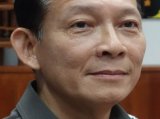
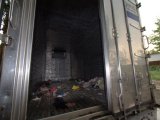
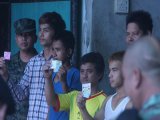
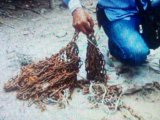
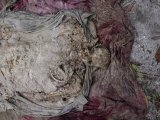

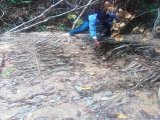
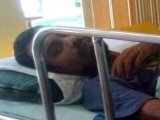
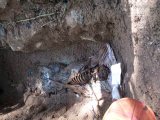



It's absolutely clear that the issue of trafficking along these route can be dealt in terms of investigation only in a cross-border manner.
However, this investigation should be done under UN or a similar organisation management, in order to be trusted.
It would be good if Thailand would call voluntarily an international investigation now, as if that will be called by other parties, especially after initial investigation would appear flawed, it will be another very hard rock thrown at Thailand reputation and credibility of its institutions within the framework if universal human rights.
Posted by Sue on May 6, 2015 22:58